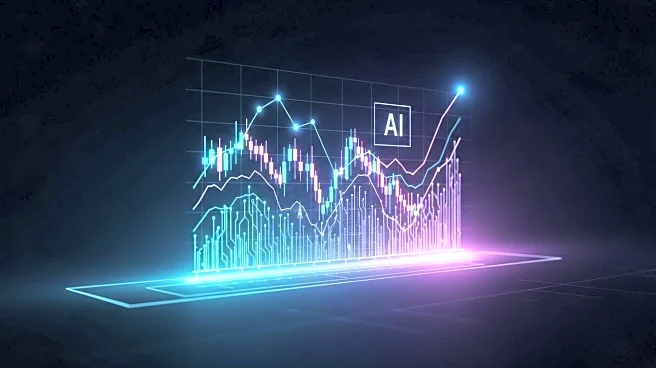What's Happening?
The U.S. stock market is experiencing record valuations, raising concerns about a potential correction similar to the dot-com crash of the late 1990s. The Shiller price-to-earnings (P/E) ratio, a long-term gauge of stock market valuations, has recently closed at over 40, significantly higher than its historical average of 17.3. This surge is largely driven by speculative investments in artificial intelligence (AI) stocks, with billions of dollars being poured into the sector. The market's top-heavy structure, concentrated in a few AI-focused tech stocks, adds to fears of a potential market correction. Experts warn that while these conditions do not guarantee an immediate crash, they suggest a fragile market that could be disrupted by shifts in investor confidence or missed earnings forecasts.
Why It's Important?
The current stock market conditions have significant implications for the U.S. economy and global financial systems. High levels of speculative investment in AI, with few tangible payoffs, could lead to a market correction that might spill over into broader economic instability. The concentration of value in a handful of tech stocks makes the market vulnerable to disruptions. If a correction occurs, it could impact investor confidence, leading to reduced capital flows and potential economic downturns. The situation also highlights the risks associated with speculative bubbles, where asset prices are driven by expectations rather than fundamentals, potentially leading to significant financial losses for investors.
What's Next?
Potential triggers for a market correction include renewed inflation scares, companies missing earnings forecasts, or shifts in trade policies. Experts suggest that a significant correction could occur if investor confidence wanes or if there are changes in economic indicators. The market's response to these triggers will be closely monitored by investors and policymakers. Additionally, the ongoing debate about the sustainability of AI investments and their impact on market valuations will continue to shape investor strategies and economic forecasts.
Beyond the Headlines
The enthusiasm surrounding AI investments is reminiscent of past technological bubbles, such as those in railways, bicycles, and internet stocks. This raises questions about the long-term viability of AI as a market catalyst and whether current valuation metrics are applicable. The situation also underscores the importance of understanding the true worth of investments and the potential consequences of speculative behavior. As AI continues to transform industries, there will be winners and losers, with significant implications for economic stakeholders.










